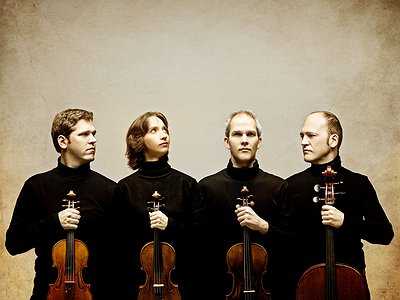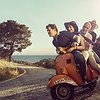There are many descriptions of the ideal state of mind for being creative. What is it like for you? What supports this ideal state of mind and what are distractions? Are there strategies to enter into this state more easily?
Most difficult for a quartet is for all four members to reach this ideal state at the same time. Often one or another member feels particularly free or open on a given evening while others are frustrated or less inspired. When we do collectively enter this state, however, it is as if all four members move together and allow the phrases to breathe without any effort or conscious direction, as if the musical discourse were a spontaneous and inevitable unfolding of the piece.
How do you make use of technology? In terms of the feedback mechanism between technology and creativity, what do humans excel at, what do machines excel at?
Our main use of technology is through recording ourselves in rehearsal and of course in the studio. Hearing an approximation of ourselves from the outside has been invaluable in resolving arguments and finding what most needs the most attention. While playing it is very difficult to imagine the experience of listening from the outside and with recording technology we can come close to that ideal, allowing for the necessary limits on what a microphone can pick up and where it is placed. Abel and Arnau also play from iPads, which make page turning and lighting much less problematic and allow them to also switch between part and score with incredible ease.
Collaborations can take on many forms. What role do they play in your approach and what are your preferred ways of engaging with other creatives through playing together or just talking about ideas?
How 'outside' influences affect the dynamic of a quartet is very difficult to define, yet very important. We once played a tour with a substitute second violinist when one member's son was born; it was a lovely tour on which we had no larger intention to rework our interpretations of the pieces we played. Upon returning three weeks later, when we took up the same repertoire with our violinist, he stopped the rehearsal and said he couldn't recognize what we were doing. By some slow and unconscious process, the piece had evolved in a very different direction, and we weren't even aware that anything had changed.
How is playing live and writing music in the studio connected? What do you achieve and draw from each experience personally? How do you see the relationship between improvisation and composition in this regard?
As we do not compose music ourselves, we can't really answer this question, although forms of improvisation are very important to us when rehearsing. We find that 'rewriting' the music, either by adding or leaving out notes or changing rhythms and articulations are invaluable tools for getting inside the workings of a piece.
How do you see the relationship between the 'sound' aspects of music and the 'composition' aspects? How do you work with sound and timbre to meet certain production ideas and in which way can certain sounds already take on compositional qualities?
One could say that this question is at the heart of an interpreter's work: how a score can be realized in actual sound. We see all elements of the written score as dynamic and integral clues as to how the piece could sound in a given acoustic. We have learned that no element (tempo, rhythm, pitch, etc.) can be isolated and treated as sacrosanct - all of the elements of an interpretation depend to varying degrees on each other and certainly change depending on the acoustic in which we perform.
Our sense of hearing shares intriguing connections to other senses. From your experience, what are some of the most inspiring overlaps between different senses - and what do they tell us about the way our senses work? What happens to sound at its outermost borders?
We find visual and sensual images often more effective at describing the sounds we are looking for than technical descriptions. When rehearsing, we have the difficult task of explaining to one another how we imagine the music - there are lots of possibilities, but often we understand each other better by describing sensations, colours or pictures than by means of a more 'objective' vocabulary, which inevitably proves inadequate, even at its most detailed.
Art can be a purpose in its own right, but it can also directly feed back into everyday life, take on a social and political role and lead to more engagement. Can you describe your approach to art and being an artist?
We took the name of Pau Casals for our quartet not only in admiration of his great musicianship, but also for his humanitarian purpose and importance as a symbol of the struggle for democracy and human rights. We have played, and continue to play as part of various initiatives to further these goals, but we have also internalized the Casals' democratic ideal in the way that we work. We have neither a leader nor a boss, each person has an equal voice in the quartet and this democratic character is essential to our experience of playing string quartets.
It is remarkable, in a way, that we have arrived in the 21st century with the basic concept of music and performance still intact. Do you have a vision of music and performance, an idea of what they could be beyond their current form?
String quartets were meant to be heard in an intimate space and it is hard to imagine altering that fundamental aspect of chamber music. Having said that, we hope that 'classical' music will continue to become more accessible to people outside of its traditional audience. String quartets will never be as spectacular as other forms of music, but we hope that this unvarnished intimacy will continue to speak for itself.



